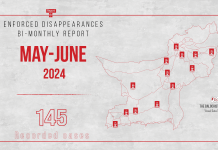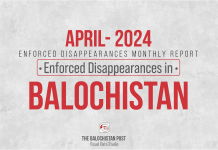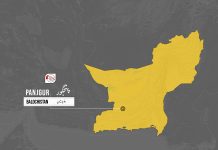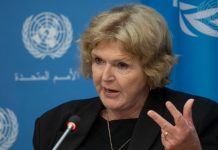Author: Zaarain Baloch
After a year-long respite, Gwadar has been catapulted into the national discourse once again. Supporters of the Haq Do Tehreek, led by Jamaat-i-Islami’s Maulana Hidayat Ur Rehman, have been protesting in Gwadar for two months or so, mirroring last year’s massive demonstrations when thousands came out on the streets, demanding the resolution of long-festering local issues. But unlike last year, the situation this time turned awry when the law enforcement agencies confronted the protestors. Police forces tear-gassed and baton-charged groups of demonstrators and arrested several dozen. A constable was shot and killed in the mayhem, and the Balochistan government booked the leaders of the Haq Do Tehreek for the incident, further fueling the unrest. As the precarious situation threatened to spiral out of control, the authorities put Gwadar under siege, imposing a harsh emergency law, blocking entryways into the city, shutting down the cellular and internet services, and rounding up protestors left, right, and center. These “gangster tactics” were bound to irk some folks, and they sure did – local and international human rights groups took notice of the situation and called on the Pakistani authorities to lift the draconian siege, allow the protestors to voice their concerns, and acknowledge and fulfill their demands.
The people of Gwadar are demanding their fundamental rights: access to fishing in their own waters; a ban on illegal trawling in Balochistan’s coasts; greater inclusion of locals in the job market; limiting the interference of security forces in the daily lives of the people; provision of quality healthcare and quality education; a reduction of security checkpoints as well as the liberalization of trade with Iran. These are legitimate demands to make, and calls for their fulfilment are nothing new; they have echoed since Gwadar, owing to the multi-billion-dollar Chinese investment, became the next most important port after Karachi and the centre of attention in the region.
The instruments may have changed, but the song remains the same. The developing imbroglio is not the first of its kind – it reflects last year’s massive demonstrations by supporters of the Haq Do Tehreek, seeking redressal of the same issues. Perhaps it has become the norm now: tens of thousands come out on the streets, seeking the fulfilment of their demands – students demanding quality education; fishermen calling for safeguarding their livelihoods; traders asking for concessions in trade with Iran; and everyone unanimously calling for the demilitarization of Balochistan. The government representatives meet with the protestors and strike a bargain, assuring them that their grievances will be alleviated in weeks and convincing them to end their protest. The protestors go back to their normal lives, hoping it would be different this time. Time goes by – weeks segue into months and eventually years, but nothing changes. Feeling betrayed, the protestors return to the streets, seeking redressal of the same issues, and back to square one.
These events repeat themselves in an endless vicious cycle – protests follow by negotiations, which, in turn, follow more intense protests. It is like the proverbial dog chasing after its own tail.
What does the Haq Do Tehreek want?
The Haq Do Tehreek is a rights movement that champions the rights of the people of Gwadar. It came under the national spotlight last year when it launched a historic demonstration in Gwadar. Aerial footage of the gathering showed a sea of people on the roads, streets, rooftops, beaches, and practically everywhere. People from the neighboring towns and cities also traveled to Gwadar to make themselves heard.
The Haq Do Tehreek proposed three demands the government acknowledged were legitimate and justified, promising to redress them. A year and a half later, the protestors are back on the roads, demanding redressal of the same issues.
First, protestors argue that hundreds of large trawlers continue to fish in Balochistan’s waters without check. They catch small fish and use technology and fishing methods that are harmful to marine life and therefore prohibited. Local communities in Gwadar and its adjoining towns are dependent entirely on fishing for subsistence. Trawlers from neighbouring areas such as Sindh and even other countries like Korea and Japan come to fish in Balochistan’s waters, severely impacting the catch of the local fishermen. The government has also given Chinese trawlers licenses to fish off the coast. The locals, with their small boats and traditional fishing methods, cannot compete with the larger, more advanced Chinese boats. The presence of trawlers has deprived them of opportunities, and the local fishermen fear starvation.
Second, the protestors criticize the heavy military presence in the Makran region, in Gwadar specifically. Thousands of security forces have been deployed to protect the Chinese installments and workers from militant attacks by the Baloch “pro-independence” groups, which have a significant footprint in the region. The region is peppered with security installations and checkpoints, which are difficult for ordinary folk to navigate. Incidents of mistreatment of the locals at the hands of security forces are reported, further widening the rift between the locals and the administration and heightening the sense of alienation.
Third, the protestors demand loosening the restrictions on informal trade with Iran. Lack of employment in Balochistan means the people have had to look for alternative sources to eke out a menial income, such as the informal trade with Iran. This trade is illegal on paper but is made very much legal by the fact the security forces stationed at the border charge a heavy bribe to allow the smugglers to pass through. The smuggling strikes a conscientious chord in the minds of the Pakistani authorities every now and then, and they come up with a new scheme to crack down on the illegal trade, like introducing measures such as the token system to slow down the trade, and even occasionally close the border altogether.
As one can expect, this engenders a massive outcry from the people who benefit from the trade, namely the traders and merchants in the neighbouring towns of the Pak-Iran border. They argue that by implementing draconian measures such as the token system, the Pakistani authorities rob them of their only source of income. Traders have also joined the protests in Gwadar, demanding concessions on trade with Iran.
The protestors’ demands are justified and reflect a deeper malaise affecting Balochistan, as its people feel they are not getting the promised fruits of ‘development’ the projects such as CPEC, Saindak, Reko Diq, and others are supposed to bring. Many argue that Maulana Hidayat Ur Rehman has political aspirations, and his popularity has tanked and support dwindled as a consequence. But there is no denying the fact that he has struck a chord with the people of the Makran region, who feel they were betrayed by the establishment-backed politicians.
The recent imbroglio
Starting on October 27, the supporters of the Haq Do Tehreek had been protesting for over two months before their pleas fell on the government’s ears, and that only after the protestors blocked numerous thoroughfares for all kinds of incoming and outgoing traffic and blocked an expressway leading to the Gwadar port. Their message was clear – the Balochistan government had reneged on its last year’s promises and failed to deliver the outcomes it had promised.
In response, the Balochistan government struck the protestors with an iron fist, imposing a draconian emergency law prohibiting gatherings of more than five people. Demonstrators continued to pour into the streets – and get arrested – as more people joined in from the neighboring towns. The Balochistan government authorized the imposition of Section 144 of the Criminal Procedure Code in Gwadar for one month to bring the situation under control.
Balochistan Home Minister Zia Langove termed the peaceful demonstrations as “violent protests” and warned that the government would not compromise on the writ of the state and the security of the Chinese nationals working in Gwadar. He said the protestors were using “women as human shields to gain sympathies.”
Maulana Hidayat Ur Rehman gave a befitting response, saying that the people of Gwadar were simply asking for their fundamental rights like water, electricity and jobs, not a five-lane motorway or Orange Line.
The supporters of the Haq Do Tehreek continued to protest against brutality and for the immediate release of their companions. All bazaars, banks, shops, and business centres remained closed for several days amid marches on various roads.
Some semblance of normalcy returned to Gwadar after several clashes between the security forces and the protestors. Shops, markets, and business centres started opening up, and traffic is restored between Gwadar and Karachi. But despite the apparent sense of normalcy, the situation is still tense. It appears that the government’s “violent and undemocratic” tactics have succeeded for now, but it is unlikely that the calm will prevail for long. The harder the protestors are pressed, the stronger they will recoil.
The people of the Makran division feel alien in their own land – a feeling shared by much of the people of Balochistan – and it is this sense of alienation that pushed people out on the roads. The promised fruits of CPEC have not materialized; the jobs have been outsourced to people from Punjab and China, which are increasingly pouring into the city, potentially reducing its local population into an obscure minority in the near future. The locals feel they have lost control over their towns and even their lives. In the Haq Do Tehrek, they saw a glimmer of hope to retake control. The government decided to resort to hooligan tactics to repress the protests, which further reinforces the perception that the people in Gwadar have no say in the daily affairs of their city and their lives. If people feel like they are being pushed against a wall, they will resort to violence to make themselves heard. And that won’t be a pretty outcome for anyone.






























